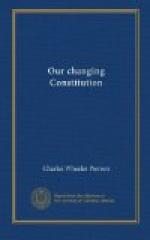By the previous ruling (i.e., in Brushaber v. Union Pacific Railway Co., 240 U.S., 1) it was settled that the provisions of the Sixteenth Amendment conferred no new power of taxation....
[Footnote 1: Stanton v. Baltic Mining Co., 240 U.S., 103, 112.]
From what has been said it will be evident that the doctrine of exemption of state and municipal bonds from federal taxation is firmly embedded in our law and has not been affected by the Sixteenth Amendment.
Whether it is a doctrine suited to present-day conditions is a question outside the scope of this paper.
The fear of federal encroachment, so strong in the minds of the makers of our Constitution, has become little more than a tradition. To many it doubtless will seem that any rule of law which operates to prevent the nation, in the great exigency of war, from taxing a portion of the property of its citizens is pernicious and should be changed.
If this be the view of a sufficient number the change can and will be made. Lawyers think, however, that it will have to be done by the orderly method of constitutional amendment, not by passing taxing statutes which a reluctant Court will be obliged to declare unconstitutional.
Just now the tide of popular sentiment is setting strongly toward such a change. It was advocated in a recent Presidential message.[1] The immunity enjoyed by state bond issues is coming to be regarded less as a safeguard of state rights than as a means whereby the rich escape federal income surtaxes. One is tempted to predict that the next formal amendment of the Constitution will deal with this subject. If so, another inroad will have been made by the General Government on the failing powers of the states.
[Footnote 1: Message of President Harding to Congress, December 6, 1921.]
X
IS THE FEDERAL CORPORATION TAX CONSTITUTIONAL?[1]
[Footnote 1: Since this chapter was first published in 1909 as an article in the Outlook magazine the specific question propounded in its title has been settled by the Supreme Court (Flint v. Stone Tracy Co., 220 U.S., 107). The paper is here reproduced, however, in the belief that its discussion of the principles of our dual system of Government is as pertinent now as it was before.]
The most noteworthy enactment of the sixty-first Congress from a legal point of view, to say nothing of its economic and political significance, was the Corporation Tax Act. That Act, forming Sec.38 of the Tariff Law, provides—
That every corporation ... organized for profit and having a capital stock represented by shares ... shall be subject to pay annually a special excise tax with respect to the carrying on or doing business by such corporation ... equivalent to one per centum upon the entire net income over and above five thousand dollars received by it from all sources, etc.
The act goes on to require the corporations to make periodical reports concerning their business and affairs, and confers on the Commissioner of Internal Revenue a visitorial power to examine and compel further returns.




